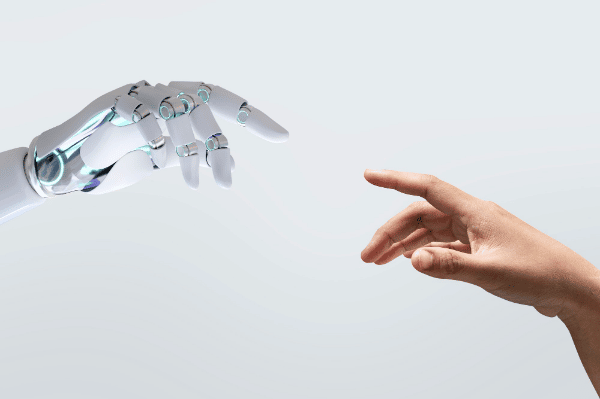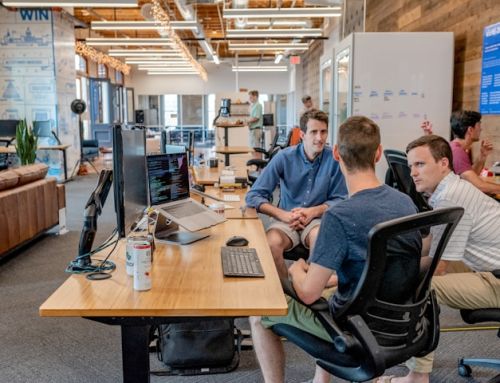Artificial intelligence (AI) is an emerging technology that mimics the human brain by utilizing complex software algorithms that analyze vast data sets to make logical decisions and generate predictions and insights. Today, AI is radically transforming the Human Resource departments at a staggering pace. Typically, HR is responsible for building and nurturing human worker relationships with the respective organizations. The repetitive nature of the Human Resource processes makes it an obvious target for AI-based implementations.
If you want to boost your HR department’s performance, you don’t have to reinvent the wheel. You only need to summon a custom AI implementation with the desired feature set. The resulting human AI collaboration will no doubt transform your business for good. In this post, we’ll look at the various ways AI is helping HR departments streamline their processes:
Image by rawpixel.com on Freepik
1. Reduced recruiting timelines
While we are still decades away from the entire elimination of human intervention in the recruitment process, AI has helped us make significant strides toward making the process simpler and much faster. For now, no one is even looking to fully automate the recruitment process.
AI-powered programs can help you sort out and filter out thousands of candidate resumes in a fraction of a second. You can also use AI to conduct intensive labor market analysis, match skills, evaluate the competency and eliminate bias, ensuring your hiring process runs efficiently. Chatbots are another great way to harness AI to assess candidates before scheduling interviews. This will go a long way in ensuring you hire the right candidates with minimum effort while saving precious time.
2. Data-backed insights and resources
AI will give you insights and resources that are fully backed by historical data from your employees. This will then allow you to take action towards delivering a quality experience for your workers that is in line with your workforce needs, thereby boosting engagement and lowering turnover. In response to the COVID-19 pandemic, you should follow the global HR response that’s rapidly changing how we work by increasingly using technology to connect workers across an organization. AI allows you to integrate your entire workforce to increase productivity while also giving you insights into what they need to thrive.
3. Work Calendar and Schedule Maintenance
Scheduling complex, daily tasks can be tedious depending on your organization’s cross-functional structures. This is especially true for employees who are dealing with personal problems or lack the energy and time to effectively maintain the company calendar. Artificial intelligence can help you neatly organize and consequently manage your employees’ personalized calendars to remind them of upcoming tasks, deadlines, duties, and meetings. This will help your employees to stay focused on their assigned tasks, thus improving productivity.
4. Automation of Administrative Tasks
Any HR department can acknowledge how laborious the ever-repetitive administrative tasks can be. The numerous email follow-ups, payroll management, correspondences, document submissions, scrutinizing performance, and compliance management are just a few of the cumbersome tasks you’ve to deal with as an HR manager. These low-level, repetitive tasks waste your valuable time that could otherwise be engaged in solving other critical issues.
However, artificial intelligence can relieve you of these repetitive administrative tasks, including assigning tasks to workers and coordinating your workforce. Consider allowing AI systems to handle the complex compliance and payroll management tasks to void the possibility of human error in these critical business processes.
5. Improve Workforce Training
Artificial intelligence can also empower your HR team when it comes to the effective training and evaluation of your workforce on an ongoing basis. AI tools can identify employee skill deficiencies and prepare training programs to equip them accordingly. While you may consider launching an e-learning program, remember that such a scheme does not sufficiently equip your employees for long-term resilience. You can, however, count on AI software to organize a well-targeted employee learning experience.
Endnote
The accelerated advancements in artificial intelligence and machine learning technologies are beckoning rapid mainstream adoption, resulting in a radical shift in how business teams interact. AI is disrupting how organizations recruit and train employees and how data is harnessed to provide people with analytics. By freeing HR professionals from repetitive tasks, they can focus on strategic tasks that demand human intervention.
As the relationship between machines and humans is constantly redefined in the workplace, no single approach exists to help manage this change across different organizations. Your organization should work closely with the HR department to define and implement an AI solution that best fits the expectations of your team and the organization’s expectations.






Leave A Comment